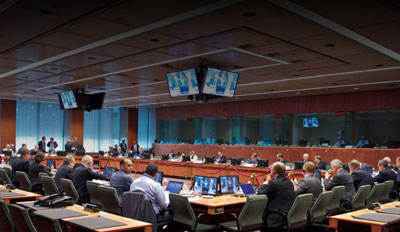Eurogroup: Points of agreement and discord

All eyes are on the Eurogroup meeting that kicks of at 7 p.m. on Wednesday with EU partners waiting with baited breath to see how the chips will fall
The Eurogroup meeting in Brussels on Wednesday has been dubbed “the battle of battles” with high stakes and low expectations. Finance Minister Yanis Varoufakis is heading to the meeting with “moderate” proposals in a “bridge program” to cover the government’s funding needs while a new debt pact can be agreed.
Key points of the “bridge program”:
1. An extension of the current loan and funding agreement for 4-6 months.
2. A reforms plan decided on by Greece that would focus on issues such as government efficiency, transparency and the clamp down of corruption, etc.
3. Negotiating the height of Greek debt on a multilateral and bilateral basis with a view of easing fiscal targets and with a commitment to high primary surpluses.
4. Linking debt to development so that repaying the debt is associated to an increase to the Greek GDP and national revenue.
5. Configuring a road map that would help in the transition from the memorandum to the post-memorandum era aimed at restoring normalcy in the country, calming markets and restoring liquidity.
Greece’s proposal scraps 30% of the agreement with the troika of Greece’s international creditors from the European Central Bank, European Commission and International Monetary Fund. The budget surplus target will be reduced from 3% to 1.5% and measures will be taken to end the humanitarian crisis in Greece.
Rather than burden European taxpayers, Greece wants to reject the remaining 7.2-bln-euro tranche from the 2014 bailout. Instead, it wants to raise the bailout cap by selling short-term T-bills worth 8 bln euros from the current 15 bln euros and make it through by paying off ECB bonds maturing during summer. Furthermore, Greece wants a return of the 1.9 bln euros worth of profits gained by central banks from Greek bond holdings.
Points of agreement:
On Tuesday, Eurogroup Chairman Jeroen Dijsselbloem extended an arm of help to Athens, saying he was “extremely willing” to work to find a solution. “I am extremely willing, from inside the Eurogroup to work with Greece,” to find a solution, Dijsselbloem told Dutch television news channel RTL Z in a weekly discussion.
A telephone call from European Commission President Jean-Claude Juncker to Prime Minister Alexis Tsipras on Tuesday was focused on finding a compromise solution. If problems are overcome, then a new packet of reforms could be decided on, such as:
1. Taxation
* an end to tax exemptions
* broadening the definition of tax fraud and evasion
* increasing the revenue yield by changing the regulation of debts to the tax office and pension funds
* restructuring the tax administration to give further independence to the Secretariat of Public Revenue
* adopt a tax on collective investment vehicles2. Public Administration
* a new payment system with a single pay roll in the public sector
* new ministry charts and an evaluation of structures
* the establishment of goals and staff assessment
* cost evaluation throughout the public sector
* restructuring utilities
* improving fiscal rules to offer greater economic independence and flexibility to public bodies3. Insurance
* Joining funds4. “Red loans”
* bank resolution schemes for problematic loans5. Bankruptcy code
* Changes to the law to address problems identified in previous assessments and to comply with court mechanisms6. Market Competition
* Legislation to address all issues identified in the OECD report on legal obstacles to competition in wholesale trade, construction, telecommunications and e-commerce
* New law on licensing investment
Possible problems
* The current government will not agree to a primary surplus worth 3-5% or covering the fiscal gap that the troika assesses to be at 2.6%.
* The new government will not change the retirement age or cut early retirement packages.
* In the employment sector, the new government is against mass dismissals or harmonizing Greece’s trade union framework to EU practices. Furthermore, the new government wants to lift Greece’s minimum wage to 751 euros/month by 2016 rather than keep it frozen.
* In taxation, the government does not want to abolish the lower VAT on islands.
Source: protothema – Eurogroup: Points of agreement and discord





























